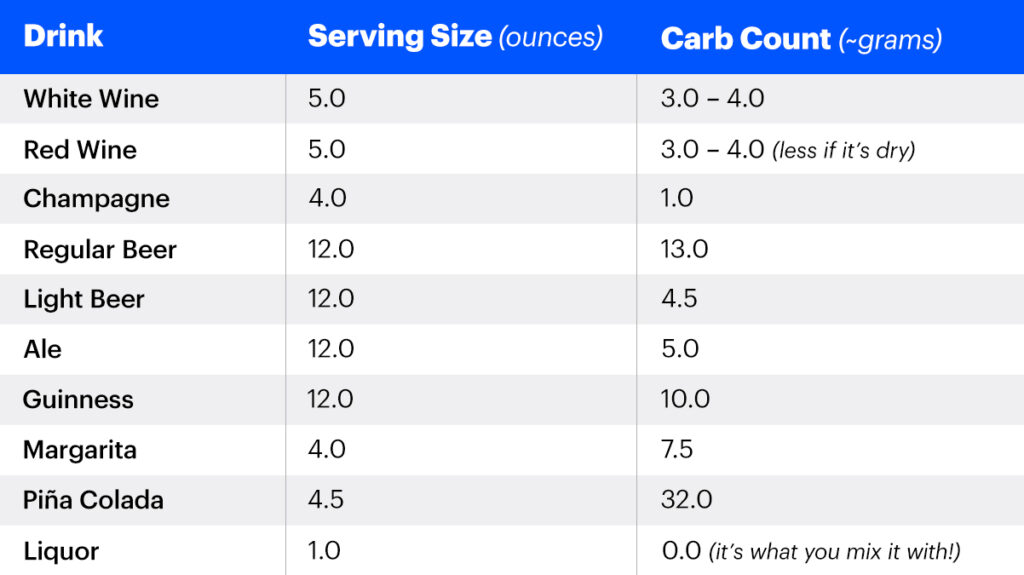
Alcohol and T1D
Drinking alcohol is a tricky balancing act for anyone, but particularly for those with type 1 diabetes (T1D).
How Does Alcohol Affect Your Blood Sugar?
Understanding and mitigating the risks
Moderate amounts of alcohol may cause blood sugar to rise, excess alcohol can actually decrease your blood sugar level – which can be dangerous for people with T1D. People with T1D should only consume alcohol while eating food.
Beer and sweet wine contain carbohydrates and may raise blood sugar. People may also overeat when drinking alcohol which also can increase your blood glucose levels.
If you are drinking at a pub or restaurant, always wear a medical alert piece of jewelry, or have an app that says you have diabetes.
Know that in an emergency, glucagon may not work as your liver is filtering the alcohol, so have someone call 911.
Talk to your doctor about drinking with T1D and ask if they would recommend any changes to your routine. Also discuss any medications you are taking and how that may impact the effect of alcohol.
Tips for Drinking Safely with T1D
Helpful tips for any occasion
Whether it be a birthday party, game night or something else, these tips will help you be prepared for any occasion where you may consume alcohol:
Know the signs of low and high blood sugar: Let your friends know about how alcohol impacts your body when you have T1D, and go over the signs of hypo- and hyperglycemia.
Make sure they can spot the signs of low blood sugar and know to call 911 immediately if you have trouble eating or become unresponsive. If you use a continuous glucose monitor (CGM) or flash glucose monitor (Flash GM), consider sharing your data so that your friends can help track your levels.
Don’t forget to eat: Always drink alcohol on a full stomach or eat while you are drinking. Before bed, have a snack high in protein and fat. You may want to set an alarm for a few hours after you go to sleep to check your blood sugar in the middle of the night.
Adjust your insulin dosing as needed: Discuss with your doctor or endocrinologist about how different types of alcohol affect your blood sugar and consider making changes to your insulin dosing before, during and after drinking alcohol.
Plan ahead for cardio: If you anticipate that you’ll be dancing, running around or anything else that may raise your heart rate, you might want to prepare for a drop in blood sugar. Plan ahead by decreasing your basal insulin (long-acting) dose if you wear a pump, or eating extra carbohydrates.
Switch it up: You may want to alternate between alcohol and water or another non-alcoholic beverage. This will keep you hydrated and is good practice whether you have T1D or not.
When Choosing Your Drink, Be Mindful of Carb Counts
We break down the carb counts in certain alcoholic drinks
In general, alcohol drops blood sugar, but sugars already present in your drinks can increase it. That’s why it’s important to pay attention to the carbohydrate count in your drinks. Knowing the effect of alcohol on blood sugar, people often stick to drinks that have a lower alcohol sugar content in order to avoid a high. Use these estimated carb counts of popular drinks to help guide you — but always check the label of your drink or use a carb counting app.

Everyone should be conscious of their alcohol intake, but when you have T1D, you have to be especially mindful at every stage of drinking–from night out to morning after.
Planning Your Night Out
How to avoid the increased risk of hypoglycemia
Whether it causes a hangover or not, drinking alcohol in excess does increase the risk of hypoglycemia. When you drink, your liver puts everything else on pause to break down and remove the alcohol. This means that it can’t do the other jobs it normally would, like releasing stored glucose when your blood glucose levels fall. This doesn’t mean that individuals with type 1 diabetes can’t drink, it just means there are some extra considerations to keep in mind while drinking with T1D. Here are a few pointers:
- It’s best to avoid drinking large amounts of alcohol. This doesn’t mean you can’t have fun, but try to pace yourself and keep track of how many drinks you’ve had.
- Make sure you always have some carbohydrates to eat before you drink. This might mean dinner or appetizers out with friends, or making something for yourself before heading out. A small snack, like an apple or piece of toast with peanut butter is a good idea.
- It’s recommended that you don’t include the carbohydrate content of alcohol in your carb-counting calculations. You should aim to eat some carbohydrates every few hours as you continue to drink.
- Test your blood glucose levels before you go to bed─if your level is normal to low, eat a snack before you head to sleep.
- If you’ve had problems with low blood glucose levels overnight, you may want to reduce your evening dose of insulin slightly, especially if you are planning to have an active night out (like dancing), or if you’ve had an active day. Check in with your diabetes team before making a final call on adjustments like this.
- It’s possible that your blood glucose levels will rise too high after drinking an alcoholic beverage that contains carbohydrates, especially if you have mixed drinks with soda, sweetened liqueurs, or large amounts of beer. When you can, choose a diet soda as a mixer and beware of sweetened liqueurs and too much beer.
A night out should be fun! But, you do need to plan ahead a bit. You can talk to your care team about how your routine might be modified for drinking, You can also talk to your friends about how they can best support you on a night out. If you take the time to prepare, you can enjoy your entire drinking experience, rather than suffering through parts of it.
The Next Morning
Don't delay or miss your morning insulin
A hangover can be dangerous when you have T1D. Delaying or missing your morning insulin can result in your blood glucose levels rising too high. Here are some important steps to take before and during a hangover:
- If you know you’ll be drinking, make sure to set your alarm clock to wake you within an hour or so of your usual waking time. You don’t want to sleep through a meal or insulin dosing.
- If you feel up to it when your alarm goes off, eat! If not, you can take your normal (or a slightly reduced) dose of your intermediate or long-acting insulin.
- Before going back to bed, set another alarm to wake you again in two hours, so that you can again check that your blood glucose level is not too low.
- In an ideal world, one alarm will be enough─but if you’re feeling particularly groggy after the second one, be sure to set another.
Enjoying Your Night Out
A well planned night out can be an enjoyable drinking experience
A night out should be fun! But, you do need to plan ahead a bit. You can talk to your care team about how your routine might be modified for drinking, You can also talk to your friends about how they can best support you on a night out. If you take the time to prepare, you can enjoy your entire drinking experience, rather than suffering through parts of it.